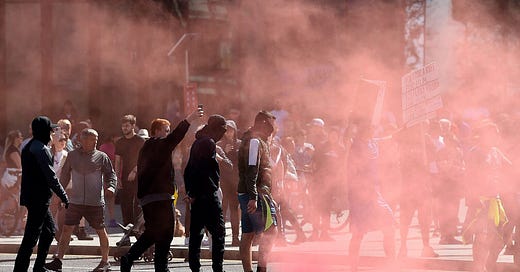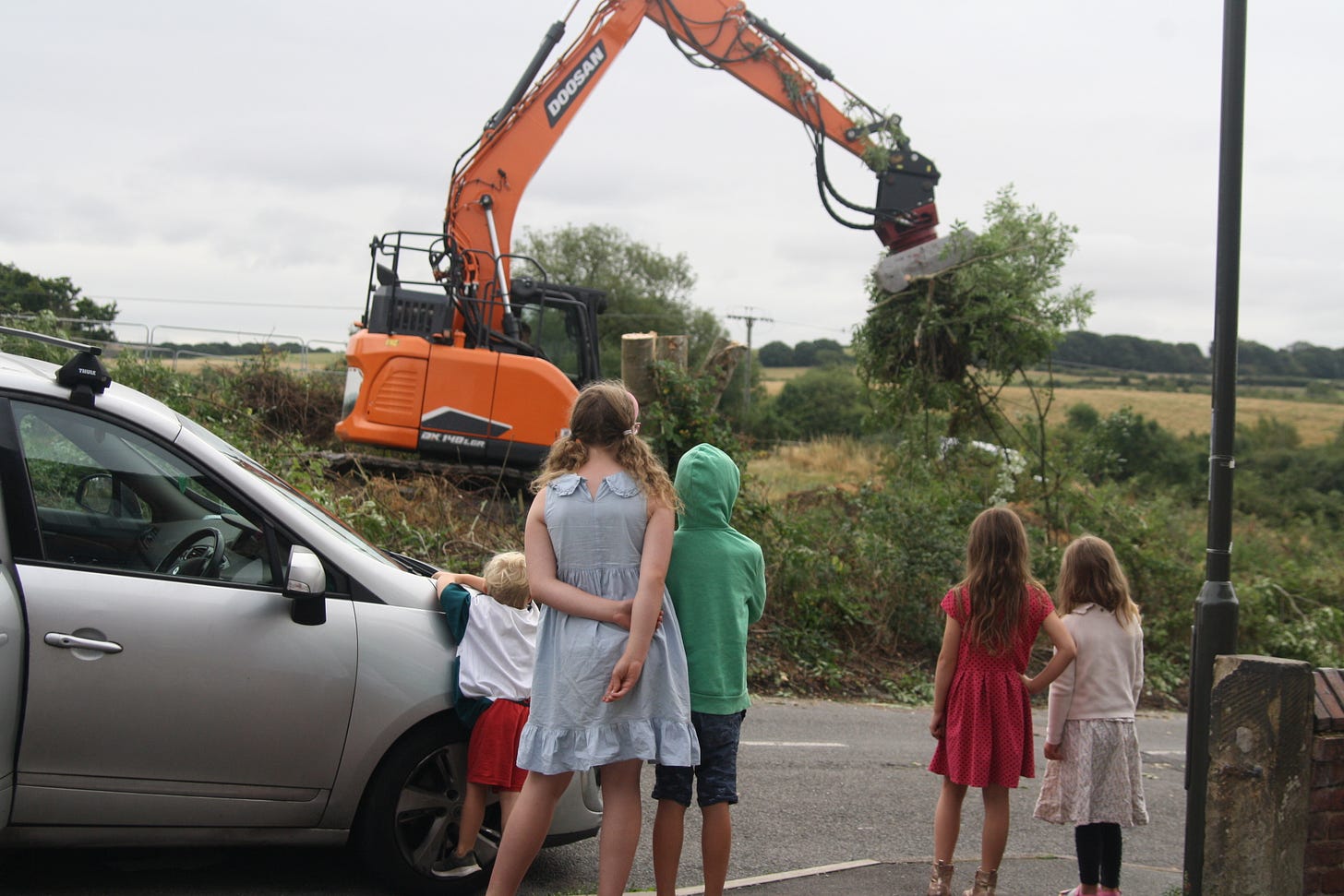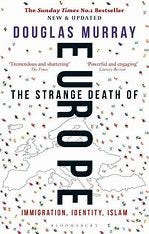The recent civil unrest in the UK may have many branches but its roots lie in the societal rootlessness resulting from decades of enforced multiculturalism.
For many people, home no longer feels like home. They do not know where or how they belong anymore. Such fragmentation did not happen by accident, but by policy. Those who disagreed with the mass renovations to their societal home were not consulted. There was no planning permission. No referendum. It just started to happen. And then it kept happening.
Those who opposed it too strongly were soon demonised as hateful and unwelcoming. It became increasingly inconvenient to oppose it, so most simply gave up. They opted to keep their heads down and try to live their lives as normal, as if the industrial diggers all around them were not really there, upturning the foundations they thought they knew.
The Rupturing of Foundations
As I write this, I can see literal diggers across the road from our house, tearing down hedgerows of what have been—for centuries—horse fields, paddocks, and woodland, in order to build 400 new houses.
Local residents here long before us had been fighting the “development” for over a decade, and finally lost on appeal last year. It has caused much sadness, even anger, in the area (there is a local Facebook group called “Rage” dedicated solely to the development, for example!).
Even knowing it was going to happen did not prepare many of the neighbours—even my own family—from visible upset at the physical destruction to the surrounding environment. This is natural greenery which many have known to be there for decades, something we can see being tangibly undone before our eyes.
Things like this are happening in similar places across the country. There are many reasons for the housing crisis but few can argue it is not determinatively exacerbated by the kind of mass scale immigration—undergirded by the doctrine of multiculturalism—which requires a country to need over two hundred thousand new houses per year.
But aside from the particular issue of the destruction of the English countryside, what is currently happening across the road is also an apt metaphor for what many people feel about what is happening across the nation. They are seeing their culture and traditions torn away before their eyes. They are feeling utterly helpless to do anything about it. They are worried they might be labelled “selfish” for wishing that it was not happening, let alone saying so out-loud.
Death By Ideology
The tensions borne from the rupturing of a culture can be made to sound sensible by the all-encompassing ideology of “multiculturalism” but they cannot be buried for long. They have a tendency to erupt. This is what we have seen in recent times, however regrettable the events have been.
Douglas Murray warned about this problem almost a decade ago in The Strange Death of Europe. At the time, Murray was deemed something of a pariah for talking about immigration in civilisational terms, especially for highlighting the particular danger of a culturally embedded religion like Islam taking root in Britain as a result.
Indeed, the infamous political spin-doctor of New Labour, Alastair Campbell, recently suggested that Douglas Murray be investigated by the police for writing such a book, arguing that it may have helped incite some of the recent riots. As Konstantin Kisin highlighted regarding Campbell’s accusation, you can tell something’s very wrong when people are castigated not for being proven wrong but for being proven right!
As Murray pointed out—and has continued to point out—multiculturalism is essentially an ideological myth. It is the idea that multiple divergent cultures and traditions can be peacefully imported into co-existence with a dominant and/or host culture without causing the kind of real-time aggravated tensions we have seen manifested in recent times.
One may always be able to point to positives here and there about the comingling of cultures, of course. There can indeed be moments of mutual appreciation and learning when different ways of life coalesce. Not only this, but there are also negative—often horrendous—examples in history of where dominant cultures have sought the kind of conformity that refuses to tolerate peoples different to them.
The fear of becoming—or seen to be becoming—anything like such negative examples is powerful. It is this fear that dupes so many British people today into believing that multiculturalism not only makes sense, but believing that to disagree that multiculturalism makes sense probably indicates a fascist, racist, or xenophobic trajectory.
This is why the ideology of multiculturalism is so dangerous, because it seems so unassuming, so virtuous, so “obviously” true, as though we shouldn’t even need to think about it. People who adopt it tend to see the world not with it but through it. This is why they often cannot see it as an ideology. Multiculturalism is seen as the fundamental solution to societal disharmony when, in fact, it has caused—and will continue to cause—major societal disharmony by ignoring the significance of what culture truly means to people.
This is the case not only in those cultures now being drastically altered by uncontrolled mass immigration, but even among migrant communities themselves. The desire of immigrant populations (especially Muslims) to cling to the cultural and religious moorings of their own families and traditions rather than assimilate under the multicultural banner is hardly surprising. No doubt, many will continue to make use of the multicultural vision, but only in order to assert their own cultural values.
It’s understandable that people from other cultures wish to preserve their own way of life when they come to a different place. It’s not a strange thing at all. What is strange—as Murray well observed—is that the host culture (western Europe and its anglophone siblings) does not seem to think there is anything particularly worth preserving. In fact, as was reemphasised to me on a trip to Washington earlier this year, we are increasingly taught to be embarrassed of our cultural heritage rather than proud of it.
The Melting Pot and Islam
The myth of multiculturalism is that everyone can put a little of their own cultural “spice” into the melting pot without fundamentally upsetting the overall flavour, consistency, and viability of the whole.
No doubt this is possible here or there. There are plenty of examples of mutual flourishing in the growth and development of cultures. All cultures have already done this in one way or another at some point in their formation, and will continue to do so. But cultures adapt best when they do so gradually, organically, and according to established principles, rather than via swift revolution (violent or bureaucratic).
The problem with multiculturalism is not the mixing of people from different backgrounds per se but the ideological assumption that the “melting pot” is not only possible, not only desirable, but inevitable. In actual fact, it is neither possible nor desirable because it either leads to the destruction of all cultures or simply becomes a subtle means by which the host culture (e.g. western Europe, downstream from Christendom) passively submits to stronger convictional cultures like Islam over the long term.
Who is in charge of this melting pot anyway, we might ask? Who controls the temperature? What do they believe, and how does it affect the way they manage the pot? Indeed, is a “melting pot” even the appropriate metaphor? After all, it involves putting all cultures into a pot and melting (that is, destroying and/or mutating) all into one.
While many immigrants do assimilate into British society, the question is: what are they assimilating into? What even is British culture now? What are its defining characteristics? What is it not? Few can answer anymore because they have been told that their primary purpose as a culture is to enable other cultures to thrive at the expense of their own.
This ends up meaning that the cultures welcomed into western societies by multicultural ideology are celebrated and protected, while the ‘host’ culture is made to feel like it no longer belongs as the norm, as the host. But once our nice, tolerant, pro-multiculturalism culture is no longer the host culture, will it be replaced by something equally tolerant of others? No. It will be replaced by Islam.
But is this not “fearmongering” and “Far Right Extremism”, the kind which the socio-political Left are so keen to warn us about? Are not Muslims mostly lovely people who mean nobody any harm and are all perfect multicultural citizens simply getting on with their “religion of peace”? We cannot speak to the loveliness or otherwise of individual Muslims en masse, but we can speak of the beliefs of Islam, which—if adhered to consistently—necessitate the kind of socio-cultural change that cannot do anything but continue to replace the existing cultural foundations with its own. That is literally how it works when it’s working “properly”.
This is not negotiable, however nice your westernised Muslim neighbours next door happen to be. At the going rate, given enough time, given enough children, given enough mosques, given enough tolerance, Islam will fundamentally change what Britain is. In many ways, it already has.
The Roots of the Rootlessness
The British natives who opposed multiculturalism did not (and do not) even grasp precisely why they are so unhappy at the fundamental erosion to their way of life. Only once things they never knew they cherished began disintegrating did they realise how much they valued the previously unspoken norms in their culture, which they now find themselves largely helpless to stop—like my children watching their fields disappear before their eyes.
A couple of weeks ago (just before the riots began) I released part 3 of my multi-part review of Joe Boot’s Mission of God, where I referred to
the nihilism of our secular age, where the very concept of ‘civilization’ is fast becoming unravelled in the gleefully ‘post-Christian’ understanding of society. [Boot] points to numerous examples of this, including the outbreak of looting and rioting among younger generations, which Boot sees as indicative of a cultural rootlessness emanating from a sense of historical amnesia of where we have come from as a society. Indeed, the postmodern West is, in a sense, the product of a kind of ‘looting’ of inherited values, taking what it wants and discarding what it doesn’t want, all oblivious to the wider consequences.
Boot was not referring to multiculturalism per se (which he also critiques directly in chapter 10) but the ideas he refers to there (nihilism, etc.) are certainly at the root of how people come to believe in multiculturalism. To uproot people so fundamentally is to create the conditions for the societal chaos we now see unfolding.
One day, Britain as we knew it will be gone. Some may so, “Well that’s always the case; nations always change.” Perhaps so; but how did it change? According to what principles? Along what lines? Who gets to decide how it changes? If the Nazis had won the Second World War, would it have been right to simply accept the “change” that would have been wrought in Britain as a result? Would it not have resulted in a distinct loss of identity? “Don’t be absurd! That was different!” may be the reply. Perhaps. But if a government—whether your own or another nation’s—decides to do things which will drastically undo the foundations of what you believed your country stood for, and you essentially have no say in it, one may start to observe a few parallels.
Two Kinds of Thug
As Britain changes, those who have been upset to the point of rioting now flail in desperation, sensing what is being lost. But it should be noted that they themselves were already living lives which were uprooted from the soil of their forebears anyway. They are by no means innocent in this great societal erosion.
Why? Because they had already abandoned much of the inherited Christian soil that once undergirded their nation. Generally speaking, the average Anglo-Saxon Brit today is not only less observably Christian than their grandparents, but less patriotic, less noble, less courageous, less industrious, less virtuous. I don’t say that to glamorise the past. It’s just a fact. We have not been faithful heirs of what we received.
Had recent generations not been asleep in the dreamworld of entertainment saturation, postmodern indulgence, and moral relativism (“each to their own!”) perhaps they may have had more to offer as a cultural bulwark against the erosion. Perhaps they might have been more collectively influential upon the kind of political decision-making which has rendered multiculturalism the calculated explanation and justification for the inevitable effects of uncontrolled mass immigration over several decades.
Hateful thugs should be brought to justice, whoever they are. But bureaucrats with power are not averse to acting like thugs too. They just know how to hide their thuggery better than the average street mob. Putting thugs in their place may stave off the current crop of bitter fruit but it will not magically create roots for the rootless. The anger will continue to spring up year on year unless the rootless find roots.
Few realise that multiculturalism was not a neutral and peaceful addition to a flourishing garden but an aggressive de-rooting of the roots that were previously there. It poured concrete over the soil to ensure those roots cannot and will not flourish in future. It is said that this will be good in the long run because it allows many different kinds of plant to live all as one (albeit in separate pots). This imposition is only possible by exploiting the genuine tolerance germane to Christian cultures, which is manifestly less present within non-Christian cultures (or not to anywhere near the same degree).
As Tim Dieppe said, in an insightful article on the problems with multiculturalism in 2018:
The multiculturalist tries to say that society can continue without any favoured religion or worldview. This is self-defeating because multiculturalism itself is a favoured worldview. It is also inherently unstable. Different religions and worldviews proclaim different values and ethics which will unavoidably clash. A society with no agreed moral or religious foundation cannot avoid collapsing or fragmenting into a set of isolated subcultures abiding by different values. This is already what we are seeing in the UK with segregation of our society into enclaves dominated by certain religions, most notably Islam in certain areas.
Ultimately, multiculturalism cannot produce long-lasting harmony within a society because it has no sustainable foundation. It is rootless by design and will ironically only create further fragmentation and division.
Soil, Seeds, and Fruit
The bitter fruit of multiculturalism cannot simply be exchanged for good fruit. You cannot get good fruit without the planting (or replanting) of good seed in good soil.
Jesus once told a parable about this. The fact that a critical mass of people in this country probably no longer know what that parable is (let alone what it means) illustrates its truthfulness.
"When anyone hears the word of the kingdom and does not understand it, the evil one comes and snatches away what has been sown in his heart. This is what was sown along the path." (Matthew 13:19)
The only way to bring true and lasting societal harmony between many different peoples is through the Gospel of that Great Sower Himself, the One who was willing to die for all people, whoever they were, wherever they came from, that those who believe in Him might not perish in their sin but find everlasting new life in the glory of that Man's resurrection from the dead.
This is how God brings the rootless back home. This is how He re-roots them, and how He will continue to unite the ununitable—not via a plastic political ideology but with true substance, true diversity, true love, true joy, true peace, as the good fruit of His Spirit among His people.
This Gospel may be offered to all, but its fruits are not automatically available to all. They are available only to those who drop their nets—and their nonsense—to follow Him wherever He leads, whatever it costs. This is ultimately the only way a culture can be truly preserved, restored, or changed for good rather than for evil.
But it’s not automatic. There are things that need to happen; things that need to be not merely seen and heard but applied. Yet the root of what must happen is the planting of good seed. What must happen to stop what is currently happening, is not riots, but a revival of Christian faith in this nation.







I am what is commonly known as an atheist (although I'm with Sam Harris in that I don't think the term should need to exist). I don't, therefore, hold with the religious aspects of the last third of the article. That said, I do recognise the cultural inheritance of the West's past, and agree wholeheartedly that our passive tolerance will be used against us. When, in a thousand years, someone replicates Gibbon's great work on Rome, the writer of 'The Decline and Fall of Western Civilisation' - who will undoubtedly be Muslim (male, of course!) - will conclude it committed suicide.
An excellent piece, many thanks.
Christianity in the West seems to be the only religion who is ashamed of its Savior. We have got to stop apologizing for being a Christian ESPECIALLY IN OUR OWN COUNTRY whose laws were supposed to provide true justice for all! At the end of the day, we have got to stop being ashamed of Christ and proclaim Him proudly and boldly. No more shame!